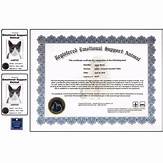How to Register a Pet as a Service Animal
Service animals provide invaluable assistance to individuals with disabilities, improving their quality of life and independence. If you're considering registering your pet as a service animal, here's a comprehensive guide to help you through the process.

What Qualifies as a Service Animal?
According to the Americans with Disabilities Act (ADA), service animals are defined as dogs that are individually trained to do work or perform tasks for an individual with a disability. This includes tasks such as:
• Guiding individuals who are blind or have low vision
• Alerting individuals who are deaf or hard of hearing to sounds
• Providing physical support and assistance with mobility tasks
• Performing specific tasks for individuals with psychiatric disabilities
Steps to Register a Pet as a Service Animal
1. **Consult with a Healthcare Professional:**
First, consult with a healthcare professional to determine if your disability qualifies for a service animal. They can provide a written statement that outlines your disability and the specific tasks your service animal will perform.
2. **Train Your Pet:**
Enroll your pet in a specialized training program for service animals. The training should focus on obedience, task-specific skills, and socialization. Training should be conducted by a qualified professional with experience in training service animals.
3. **Obtain Certification:**
After your pet successfully completes the training program, you may obtain certification from the training organization. This certification serves as proof that your pet is a qualified service animal.
4. **Register Your Pet with the Appropriate Authorities:**
Depending on your location, you may need to register your pet as a service animal with the local government or relevant authorities. The registration process may vary, so it's essential to research the specific requirements in your area.
Public Access Rights for Service Animals
The ADA grants service animals and their handlers specific rights in public places. These rights include:
• Access to public transportation
• Access to public buildings, including government offices, schools, and hospitals
• Access to restaurants, hotels, and other places of public accommodation
• Exemption from pet fees and restrictions
Responsibilities of Service Animal Handlers
As a service animal handler, you have certain responsibilities to ensure your pet's behavior and safety, including:
• Maintaining control of your service animal at all times
• Ensuring your service animal is well-behaved and does not pose a threat to others
• Cleaning up after your service animal's waste
• Providing appropriate care and veterinary attention for your service animal
By registering your pet as a service animal and following the necessary steps, you can provide invaluable assistance and enhance your quality of life. Remember, service animals play a vital role in supporting individuals with disabilities, and it's crucial to ensure they receive the respect and accommodations they deserve.
Declaration: All article resources on this website, unless otherwise specified or labeled, are collected from online resources. If the content on this website infringes on the legitimate rights and interests of the original author, you can contact this website to delete it.






